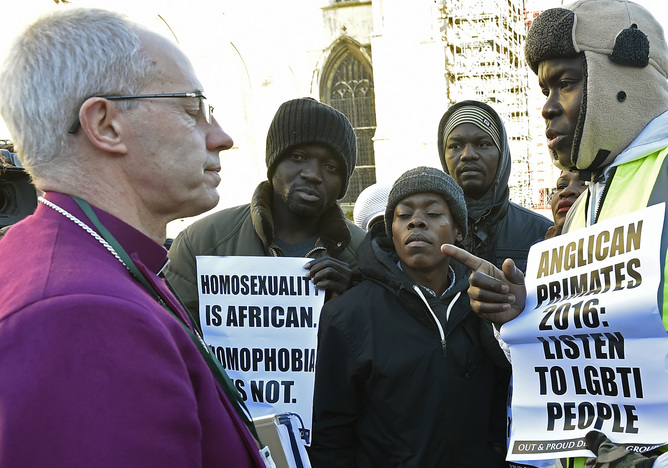
Justin Welby talks to protesters outside the Anglican summit. Reuters
Anglican ruling against same-sex marriage marginalises US church
There was concern that the communion – a group which brings together Anglican churches across the globe – would split up if it could not agree on a position on same-sex marriage. While the US church has embraced same-sex marriage for some years, more conservative congregations, particularly in Africa, remain vehemently opposed.
It is very unfortunate that to preserve the communion from breaking up, the majority got together and slapped sanctions on the US branch of the church for supporting same-sex marriage. At the meeting, it was decided that US church leaders had made a “fundamental departure” from the faith in accepting same-sex marriage.
Perhaps with the aim of deterring other churches from following its example, the US province has been demoted to observer status for three years. It won’t be able to participate in the Anglican Consultative Council or ecumenical and interfaith activities.
If the church leaders are truly committed to “healing the hurt” caused by this row, they should perhaps consider the not insignificant section of its followers that will be hurt by the outcome of their meeting. Many LGBTI Anglicans and those who support them across the globe will have been left feeling at best overlooked and at worst utterly rejected by their church.
A sad message
The Archbishop of Canterbury might have saved his communion from splitting but potentially at the expense of having put on hold truthful engagement with those who differ on issues of sexuality.
The primates seem to have used disciplining as a tool to bring the episcopal church into line. The latter has embraced same-sex marriage, changing its cannon laws to accommodate and be faithful to its members. According to the primates in the communique, important cannon laws cannot be changed unilaterally and without catholic unity. Such actions will invite consequences, as explained by Welby in the press conference.
It’s to be welcomed that the primates have at least acknowledged their differences on the issue of sexuality, rather than behaving as though Anglican doctrine on marriage was a finished matter.
Since the consecration of the openly gay priest Gene Robinson as an Episcopal Bishop in 2003, the Anglican Communion has struggled to come to terms with the changing nature of marriage.
Some US churches became more and more liberal, while the more evangelical and conservative sections continued to hold the view that marriage is exclusively between a man and a woman.
That tone seems to have changed in the current primates’ debate, where the “exclusive” idea has not been mentioned. Nevertheless, the conservative perception of marriage has prevailed. The sanction levied against the US church for its attempts to be inclusive makes second-class Anglicans of its members.
The fact that they will not be allowed to be elected in the internal committees and excluded from decision making as equals questions the very nature of the disciplining process in the Anglican Communion. If the primates are truly committed to “restoration of relationship, and the rebuilding of mutual trust”, they should have thought and acted differently.
Restoration does not come from exclusion. The primates seem to have acted out of fear, even while the Episcopal Church acted out of love in changing its cannon laws.
Michael Curry, the presiding bishop of the Episcopal Church, responded poignantly to the primates sanctions, saying:
“Our commitment to be an inclusive church is not based on a social theory or capitulation to the ways of the culture, but on our belief that the outstretched arms of Jesus on the cross are a sign of the very love of God reaching out to us all. While I understand that many disagree with us, our decision regarding marriage is based on the belief that the words of the Apostle Paul to the Galatians are true for the church today: All who have been baptized into Christ have put on Christ. There is no longer Jew or Gentile, slave or free, male or female, for all are one in Christ.”
The primates could have used this opportunity to initiate a communion-wide consultation, so that the Anglicans could have had more say in this matter.
The Scottish Episcopal Church, for example, has successfully initiated such a practice in the form of what it calls the cascade process. This approach, which aimed to give a voice to ordinary Anglicans on the marriage debate, was widely supported by congregations. It is hoped that this would eventually lead to amending the cannon laws in the Scottish Episcopal Church.
Using the instrument of communion for mutual learning and betterment of each other’s lives could have been a better option than slapping sanctions on the US church. Every day many LGBTI Anglicans across the world are discriminated against and their lives threatened. Sadly this seems to have failed to occur to the primates. The Anglican Communion prides itself in learning from its diversity but unfortunately not at this juncture.
The mistrust the primates refer to in the statement released after their meeting is wholly brought about by lack of appreciation of the dynamic nature of God’s love among all Christians, including Anglicans.
Sometimes those who fail to see the image of God in others, particularly those who differ from themselves, fail to acknowledge the unbound nature of God. The recently concluded primates' gathering has gone about doing business in a democratic manner but singularly failed to reflect the inclusivity and hospitality practised by millions of Anglicans.
This article was originally published on The Conversation.